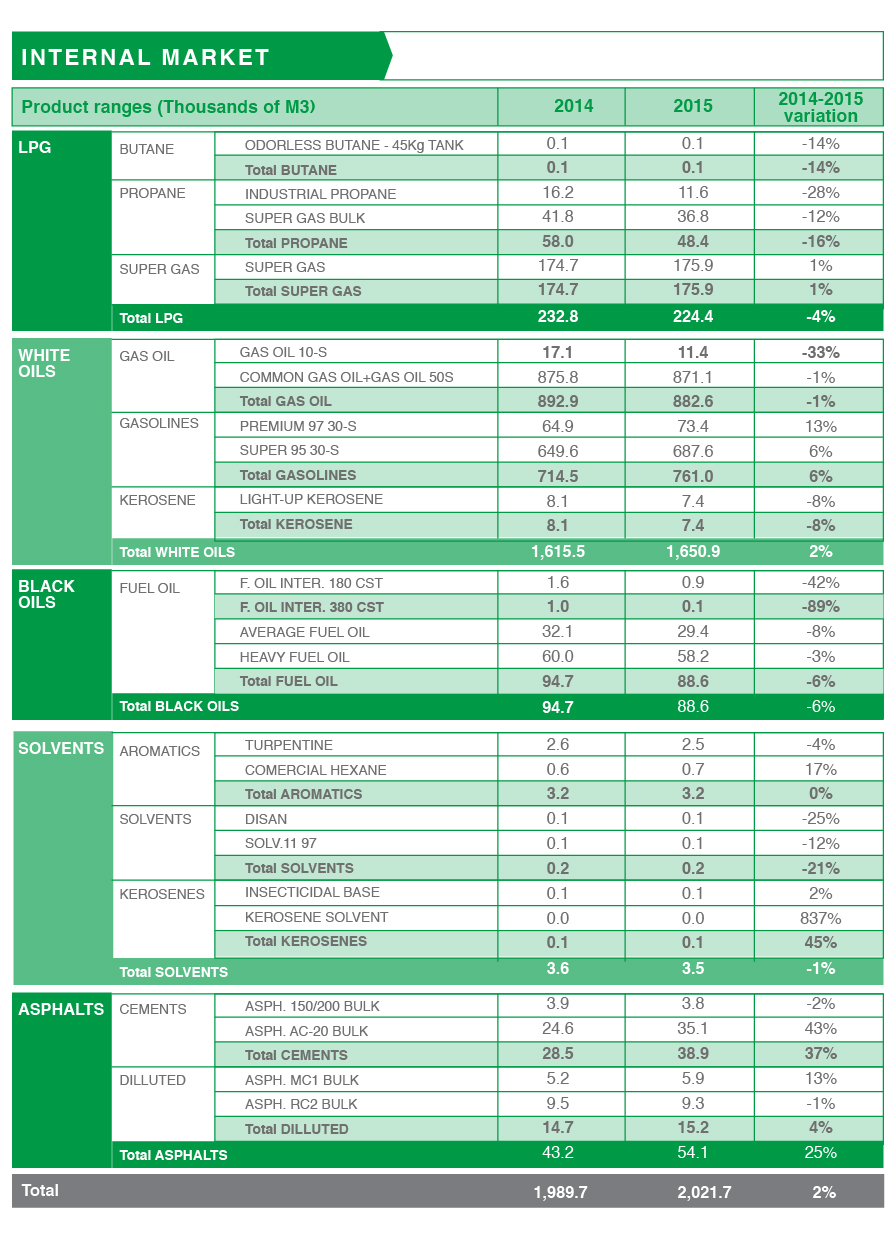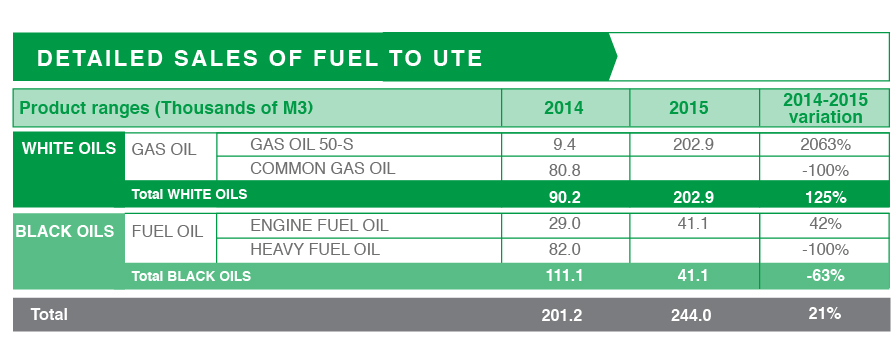1. ENERGY BUSINESSES
1.3 Internal Market
The products commercialized from ANCAP's delivery plants to the Internal Market are under a monopoly system and in some cases they compete with local importers.
White fuels and gases (gasoline, gas oil, kerosene, and Jet A-1), black fuels (fuel oil), solvents and liquefied petroleum gas (LPG, butane, and propane) are commercialized under a monopoly system, while cements and diluted bitumen are commercialized by competing with importers.
The Internal Market manages and monitors the functioning of the system of distribution of fuels, maintaining a balance between the distributor companies and considering the users' supply needs and commercial viability. This goal is accomplished while taking into account the rules established in distribution contracts negotiated with the corresponding distributor companies and commercial definitions about location and transport, and conditions on the operations of gas stations within the country.
Sales of fuels in the whole internal Market increased about 2% in 2015. The decrease in consumption from 2014 was reverted. Said decrease is the only recorded drop in the last five years. Despite the fact that the tendency is to have periods of acceleration and deceleration in consumption, there is no record of negative occurrences in the total commercialized in the internal market since the year 2006 (with the exception of 2014).
Comparative table of sales in the Internal Market accumulated up to December of the years 2014-2015

The annual growth in 2015 is explained by a high increase in the sales of asphalts (25%), which is a market where ANCAP competes with local importers, and of white fuels, which are commercialized within the monopoly (2%). The one-time allocation of works by the State and the beginning of the election period has a positive impact by increasing the needs for asphalts for the beginning of the allocated works, and the conditions ANCAP offered to the clients encouraged the sales of these products. Regarding the sale of gasoline, the annual growth is maintained, despite the slowdown that continues since 2010. The increase of tourists, as well as the opening of the exchange market in the Argentine Republic have positively affected the commercialization of this fuel in Uruguay, mainly during the first trimester of 2015.
As for the declines, the most significant is observed in the range of black fuels. This is mostly explained by the switchover of the Portland plants to coke, which entails a gradual decline of its main current energy: heavy fuel oil. The decline reaches a 6% within the whole range of products and a 3% of that particular product.
As for volume, the top product is gasoil. During the last two years, the tendency for this product is to decline. Last year inclement weather diminished the agricultural production, directly affecting the consumption of the gasoil needed for the operation of all the farming machinery and crop irrigation system.
In Uruguay, the distribution of gasoline and gasoil is made through gas stations and directly to big clients. ANCAP owns property where gas stations operate and the Commercialization Management complies with the tasks of maintenance and inversion in ANCAP's gas stations.
By focusing on increasing the participation in the fuel and lubricants market, and attending official clients to strengthen ANCAP as a brand, we continue the management of the Vehicle Control System (SISCONVE) for the public fleet. In this way, we continued with the incorporation of public fleet vehicles to SISCONVE and new functionalities, as well as commercial stations and outlets. The 2015 sales managed through SISCONVE were of about 46 thousand cubic meters of fuel.
At the same time, ANCAP is part of the commercial business of the sale of fuels and lubricants through Distribuidora Uruguaya de Combustibles S.A. (DUCSA) and the LPG business by being part of Gas Uruguay S.A. (GASUR).
Achieved goals in 2015: The 2015 management was able to provide energetic products to the country through efficient processes to clients/users, the production apparatus of the country, and the community in general, joining the growth of the Uruguayan economy during this period.
UTE Market

Within the deliveries of fuel in the Internal Market, the preceding table shows the sales of fuel to the National Administration of Power Plants and Electrical Transmissions (UTE), for the activities of generation, transmission, and distribution of electric power in Uruguay.
The goal of ANCAP with this business is to provide UTE with fuels for the generation of electric power that is complementary to the other sources of energy, in order to ensure the continuity of the supply of electric power for the country.
In 2015, fuel oil and gas oil volumes sold to UTE experienced an increase of 21% for the covered period of the commercialized total compared with 2014. An important factor to this increase of sales has been the drought suffered by the country during the first trimester of 2015, which limited the generation of power through hydroelectric dams.
